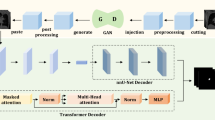Abstract
Lung cancer has been one of the major threats to human life for decades. Computer-aided diagnosis can help with early lung nodule detection and facilitate subsequent nodule characterization. Large Visual Language models (VLMs) have been found effective for multiple downstream medical tasks that rely on both imaging and text data. However, lesion level detection and subsequent diagnosis using VLMs have not been explored yet. We propose CADe, for segmenting lung nodules in a zero-shot manner using a variant of the Segment Anything Model called MedSAM. CADe trains on a prompt suite on input computed tomography (CT) scans by using the CLIP text encoder through prefix tuning. We also propose, CADx, a method for the nodule characterization as benign/malignant by making a gallery of radiomic features and aligning image-feature pairs through contrastive learning. Training and validation of CADe and CADx have been done using one of the largest publicly available datasets, called LIDC. To check the generalization ability of the model, it is also evaluated on a challenging dataset, LUNGx. Our experimental results show that the proposed methods achieve a sensitivity of 0.86 compared to 0.76 that of other fully supervised methods. The source code, datasets and pre-processed data can be accessed using the link: https://github.com/Precision-Medical-Imaging-Group/Lung-CADex.
Supported by Higher Education Commission Pakistan under NRPU Project no: 17019.
Access this chapter
Tax calculation will be finalised at checkout
Purchases are for personal use only
Similar content being viewed by others
References
Armato, S.G., III., et al.: Lungx challenge for computerized lung nodule classification. J. Med. Imaging 3(4), 044506–044506 (2016)
Armato, S.G., III., et al.: The lung image database consortium (LIDC) and image database resource initiative (IDRI): a completed reference database of lung nodules on CT scans. Med. Phys. 38(2), 915–931 (2011)
Causey, J.L., et al.: Highly accurate model for prediction of lung nodule malignancy with CT scans. Sci. Rep. 8(1), 9286 (2018)
Choi, W., Dahiya, N., Nadeem, S.: Cirdataset: a large-scale dataset for clinically-interpretable lung nodule radiomics and malignancy prediction. In: Wang, L., Dou, Q., Fletcher, P.T., Speidel, S., Li, S. (eds.) MICCAI 2022. LNCS, vol. 13435, pp. 13–22. Springer, Cham (2022). https://doi.org/10.1007/978-3-031-16443-9_2
Gong, S., et al.: 3dsam-adapter: holistic adaptation of SAM from 2D to 3D for promptable medical image segmentation. arXiv preprint arXiv:2306.13465 (2023)
He, K., Zhang, X., Ren, S., Sun, J.: Deep residual learning for image recognition. In: Proceedings of the IEEE Conference on Computer Vision and Pattern Recognition, pp. 770–778 (2016)
Kirillov, A., et al.: Segment anything. arXiv preprint arXiv:2304.02643 (2023)
Liu, S., et al.: No surprises: training robust lung nodule detection for low-dose CT scans by augmenting with adversarial attacks. IEEE Trans. Med. Imaging 40(1), 335–345 (2020)
Ma, J., He, Y., Li, F., Han, L., You, C., Wang, B.: Segment anything in medical images. Nat. Commun. 15(1), 654 (2024)
Mariotto, A.B., Robin Yabroff, K., Shao, Y., Feuer, E.J., Brown, M.L.: Projections of the cost of cancer care in the united states: 2010–2020. J. Natl Cancer Inst. 103(2), 117–128 (2011)
Moore, M.A., et al.: Cancer epidemiology in mainland south-east Asia-past, present and future. Asian Pac. J. Cancer Prev. 11(Suppl 2), 67–80 (2010)
Niu, C., Wang, G.: Unsupervised contrastive learning based transformer for lung nodule detection. Phys. Med. Bio. 67(20), 204001 (2022)
Ozdemir, O., Russell, R.L., Berlin, A.A.: A 3D probabilistic deep learning system for detection and diagnosis of lung cancer using low-dose CT scans. IEEE Trans. Med. Imaging 39(5), 1419–1429 (2019)
Planchard, D., et al.: Metastatic non-small cell lung cancer: ESMO clinical practice guidelines for diagnosis, treatment and follow-up. Ann. Oncol. 29, iv192–iv237 (2018)
Qiu, Z., Hu, Y., Li, H., Liu, J.: Learnable ophthalmology SAM. arXiv preprint arXiv:2304.13425 (2023)
Radford, A., et al.: Learning transferable visual models from natural language supervision. In: International Conference on Machine Learning, pp. 8748–8763. PMLR (2021)
Setio, A.A.A., et al.: Pulmonary nodule detection in CT images: false positive reduction using multi-view convolutional networks. IEEE Trans. Med. Imaging 35(5), 1160–1169 (2016)
Setio, A.A.A., et al.: Validation, comparison, and combination of algorithms for automatic detection of pulmonary nodules in computed tomography images: the luna16 challenge. Med. Image Anal. 42, 1–13 (2017)
Shaharabany, T., Dahan, A., Giryes, R., Wolf, L.: Autosam: adapting SAM to medical images by overloading the prompt encoder. arXiv preprint arXiv:2306.06370 (2023)
Shaukat, F., Raja, G., Frangi, A.F.: Computer-aided detection of lung nodules: a review. J. Med. Imaging 6(2), 020901–020901 (2019)
Siegel, R.L., Miller, K.D., Jemal, A.: Cancer statistics, 2019. CA: Can. J. Clin. 69(1), 7–34 (2019)
Sung, H., et al.: Global cancer statistics 2020: globocan estimates of incidence and mortality worldwide for 36 cancers in 185 countries. CA Can. J. Clin. 71(3), 209–249 (2021)
Tang, H., Zhang, C., Xie, X.: NoduleNet: decoupled false positive reduction for pulmonary nodule detection and segmentation. In: Shen, D., et al. (eds.) MICCAI 2019, Part VI. LNCS, vol. 11769, pp. 266–274. Springer, Cham (2019). https://doi.org/10.1007/978-3-030-32226-7_30
Zhu, W., Liu, C., Fan, W., Xie, X.: Deeplung: deep 3D dual path nets for automated pulmonary nodule detection and classification. In: 2018 IEEE Winter Conference on Applications of Computer Vision (WACV), pp. 673–681. IEEE (2018)
Author information
Authors and Affiliations
Corresponding author
Editor information
Editors and Affiliations
Rights and permissions
Copyright information
© 2025 The Author(s), under exclusive license to Springer Nature Switzerland AG
About this paper
Cite this paper
Shaukat, F., Anwar, S.M., Parida, A., Lam, V.K., Linguraru, M.G., Shah, M. (2025). Lung-CADex: Fully Automatic Zero-Shot Detection and Classification of Lung Nodules in Thoracic CT Images. In: Xu, X., Cui, Z., Rekik, I., Ouyang, X., Sun, K. (eds) Machine Learning in Medical Imaging. MLMI 2024. Lecture Notes in Computer Science, vol 15241. Springer, Cham. https://doi.org/10.1007/978-3-031-73284-3_8
Download citation
DOI: https://doi.org/10.1007/978-3-031-73284-3_8
Published:
Publisher Name: Springer, Cham
Print ISBN: 978-3-031-73283-6
Online ISBN: 978-3-031-73284-3
eBook Packages: Computer ScienceComputer Science (R0)





